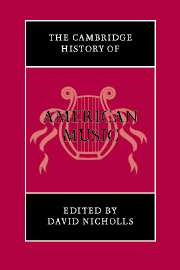Book contents
- Frontmatter
- PART ONE
- PART TWO
- 10 Music in America: an overview (part 2)
- 11 Immigrant, folk, and regional musics in the twentieth century
- 12 Popular song and popular music on stage and film
- 13 The rock and roll era
- 14 Ragtime and early jazz
- 15 Jazz from 1930 to 1960
- 16 Jazz since 1960
- 17 Tonal traditions in art music from 1920 to 1960
- 18 Serialism and complexity
- 19 Avant-garde and experimental music
- 20 Tonal traditions in art music since 1960
- Bibliography and references
- Index
- References
19 - Avant-garde and experimental music
from PART TWO
Published online by Cambridge University Press: 28 March 2008
- Frontmatter
- PART ONE
- PART TWO
- 10 Music in America: an overview (part 2)
- 11 Immigrant, folk, and regional musics in the twentieth century
- 12 Popular song and popular music on stage and film
- 13 The rock and roll era
- 14 Ragtime and early jazz
- 15 Jazz from 1930 to 1960
- 16 Jazz since 1960
- 17 Tonal traditions in art music from 1920 to 1960
- 18 Serialism and complexity
- 19 Avant-garde and experimental music
- 20 Tonal traditions in art music since 1960
- Bibliography and references
- Index
- References
Summary
Although the terms “avant-garde” and “experimental” are often used to categorize radical composers and their works, it has been noted that “‘avant garde’ remains more a slogan than a definition” (Griffiths 1980, p. 743) and that “‘experimental music’ is ill-defined and the concept it is used to describe is vague” (Rockwell 1986, p. 91). (In fairness to Rockwell, he does also stress the “bolder, more individualistic [and] eccentric” aspects of experimentalism, which suggest an “untrammeled willingness to probe the very limits of music” [p. 91].) But equally problematically, there is no clear demarcation line between the composers and repertories to which the terms are usually applied, or between the territory supposedly described by combining the two terms and that inhabited by other species of contemporary composer. Thus Ruth Crawford (Seeger) (1901–1953) and George Crumb (born 1929) might be thought of as either avant garde or experimental, while Steve Reich (born 1936) and Philip Glass (born 1937) have – over a twenty-five year period – moved imperceptibly from the experimental fringe to the postmodern mainstream, without having compromised their work to any substantive degree.
These problems of definition are at least partly attributable to two linked paradoxes. First, almost all forms of radicalism will, as a function of time, progressively degenerate into normality and acceptability: today’s novelty can easily become tomorrow’s cliché. Second (and more important), radicalism does not exist per se, but rather is a function of difference when measured against contemporaneous norms.
- Type
- Chapter
- Information
- The Cambridge History of American Music , pp. 517 - 534Publisher: Cambridge University PressPrint publication year: 1998
References
- 4
- Cited by

